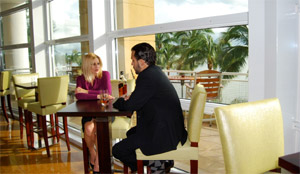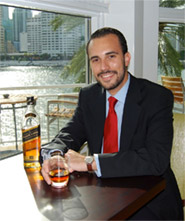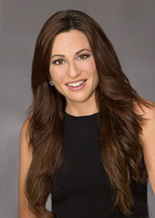Brett Graff’s Mixed Company
Roots of Hope's Felice Gorordo


This is the second in a continuing series of interviews conducted by financial reporter Brett Graff, who under her trademark “The Home Economist” covers money, power and the economic forces affecting real people. A former U.S. government economist, her work has appeared in The Miami Herald, Maxim, Glamour, Good Housekeeping, Harper’s Bazaar, Ladies’ Home Journal, Redbook, Bankrate.com, TheNest.com, TheHomeEconomist.com and more. She’s been quoted by the Los Angeles Times, The New York Times, The Fiscal Policy Institute, Women’s Health, Yahoo! Finance, Cosmopolitan and Wikipedia and has made appearances on CNN, CNBC, PBS and Headline News.

Cuban-American Felice Gorordo took his own identity crisis and turned it into a support group — for the millions young Cubans who today find their goals stunted by communism. Gorordo, 27, after mending his own disconnect with Cuban culture, co-founded Roots of Hope (Raíces de Esperanza). The organization, through an international network, delivers personal and professional development to the young people on the island to help them to achieve ambitions that might otherwise be smoldered under the government’s regime. What Gorordo started as a student group has grown to 3,000 members – you’ll recognize many of the famous names (Andy Garcia, George Lopez) — and includes organizations such as The Alliance of Youth and the National Association of Hispanic MBAs. The movement has since become powerful enough for CNN to take notice, featuring Gorordo on its show, Young People Who Rock.
We sat down with Gorordo at the M-Bar in downtown Miami for a glass of Johnnie Walker Black Label to talk about how his own life-changing trip to Cuba would later on transform the lives of so many.
First, thanks for meeting with us. How’s your drink?
Some of the best conversations in my life have been over a glass of Johnnie Walker. I remember coming home from Georgetown University after graduating, and I sat down with my dad to talk about my life, my goals, and what I wanted to accomplish. That was my first conversation with him as a man, and it was over a glass of Johnnie Walker Black Label.
I’m sure at that time you couldn’t imagine how big your student organization would have grown. How did it start?
I’d always say “I’m Cuban” but I didn’t know what that meant – mostly because I’d never been to Cuba. I took a college course on the country and the teacher told me very clearly I couldn’t learn about Cuba from a book. “Cuba from afar looks black and white,” she told me. “But as you get closer to her she’s 10,000 shades of gray.” The only way I could get to know the Cuba, she said, was by going there.
I knew I had to go.
But you don’t just buy a ticket to Cuba right?

Well, it’s easy enough if you have family there, but the whole idea was difficult for my parents. They’re divorced and rarely speak but they both agreed on one thing: I should NOT go to Cuba. “We worked so hard to get us out,” my mom said. “And now you want to go back?” But I told them it was something I had to do.
And what happened there to open your eyes to the people’s needs?
The first trip was bittersweet. I met my little cousin, Arielito, who’d been receiving all my old clothes. He looked like me, he talked like me, and he was wearing a shirt I once hated.
Arielito had never seen a cell phone before, but after a few minutes of tinkering with mine, he’d figured the whole thing out. My uncle turned to me and said, “This kid out there would be something important. But in this country he’ll amount to nothing.” Arielito is very much the reason I do what I do.
So what did you do?
This organization started as a partnership between Georgetown’s Cuban American Association and its counterpart at Harvard University. And it grew from there – word of mouth, social media. We don’t take any government money – only private donations. All our members are volunteers.
Today, we reach out to young people in Cuba, very often after going there and meeting them in person, and find for them an organization that can help them fulfill their potential.
Can you give us an example?
Roger Rubio was a college student when he was approached by a government official and asked to sign a referendum, which he read and decided against supporting. He went online – and that’s really difficult in Cuba, where the internet is banned – and searched around until he found a petition calling for change in Cuba’s political system. So he signed that instead and got kicked out of college.
When we met him, he was downtrodden. We sat with him and learned he’d wanted to become a journalist. We connected him with the non-profit, Reporters Without Borders, which gave him the tools and resources to continue his education.
He did become a journalist but I wish the story had a happy ending. Roger got married and his wife had recently given birth to a baby named Flavio when the government came knocking. They told him that if he’d wanted his son to grow up with a father, he’d better stop reporting or leave the country. So he left.
To live in exile is to be robbed of the life you chose. No, he’s not in jail. But I know he longs for the day he can hug his mother again. And under this regime, he can’t go back.
Your mission has attracted some powerful people, right?
Yes, we’ve gotten a lot of celebrity support. Andy Garcia, Juanes, who’s a Colombian rock star, Rosario Dawson, Gloria Estefan, George Lopez and Perez Hilton have all showed us amazing support.
Perez Hilton?
Let me tell you one thing about Perez Hilton: he’s extremely influential. We organized peace marches and Perez Hilton put our viral videos on his website. In one hour, he drove so much traffic there – more than 1.4 million people – that in one hour the entire site crashed. Then, he called all other celebrities who couldn’t march with us – like Ricky Martin, Shakira – to also stand in solidarity and he was successful.
And how did you meet the others?
Andy Garcia helped us during the peace marches. He was doing promotions for City Island, his latest film. Not only did he join us but he left his promotional tour to go to Los Angeles and literally roll up his sleeves and organize the march.
We didn’t have a Los Angeles office – we still don’t – so we met in small coffee shops and there was Andy Garcia, telling us what we had to do and who we had to call. From there we locked in George Lopez, Rosario Dawson.
It’s so inspiring because they realize they’ve been blessed with opportunities and feel they have a responsibility to give back. They can touch people like politicians can’t. There’s power in that, and they recognize it.
See the profiles for all of the young business leaders featured in Brett Graff’s Mixed Company Season 1.
Photography by Paola Padovan

Brett Graff is SocialMiami.com’s managing editor and has been a journalist covering money, people and power for over 20 years. Graff contributes to national media outlets including Reuters, Glamour, Harper’s Bazaar, Maxim, and the PBS show, Nightly Business Report. A former U.S. government economist, her nationally syndicated column The Home Economist is first published in The Miami Herald and then on the Tribune Content Agency, where it’s available to over 400 publications nationwide. She is broadcast weekly on two iHeartRadio news shows and is the author of “Not Buying It: Stop Overspending & Start Raising Happier, Healthier, More Successful Kids,” a parenting guide for people who might be tempted to buy their children the very obstacles they’re trying to avoid.

